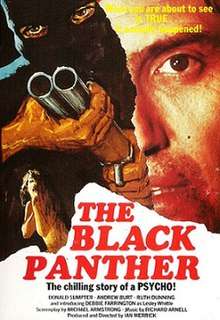The Black Panther (1977 film)
The Black Panther is a 1977 British crime film. Its subject is the real life ex-military criminal Donald Neilson, known as the "Black Panther". It was directed and produced by Ian Merrick, his first feature,[1] and stars Donald Sumpter, Debbie Farrington and Marjorie Yates.[2][3]. The movie was regarded as deeply exploitative, as it was released only a few years after the occurrence of the real life events.
| The Black Panther | |
|---|---|
 Theatrical release poster | |
| Directed by | Ian Merrick |
| Produced by | Ian Merrick |
| Written by | Michael Armstrong |
| Starring | Donald Sumpter Debbie Farrington Marjorie Yates |
| Music by | Richard Arnell |
| Cinematography | Joseph Mangine |
| Edited by | Teddy Darvas |
Production company | Impics Productions |
| Distributed by | Alpha Films |
Release date |
|
Running time | 102 minutes |
| Country | United Kingdom |
Plot
The story begins with Neilson's robbery at Heywood Post Office on 16 February, 1972. Neilson loses his black-hooded mask after a fight with the owner, but manages to escape. He later travels home to his wife and teenaged daughter, who are unaware of his criminal activity. Nielson is a strict family man, expecting complete obedience from his wife and daughter, while planning his next robberies and future kidnapping. On 15 February, 1974, Neilson robs the Post Office in New Park, shooting the sub-postmaster in the process. A reward in set for Neilson at £5,000. While collecting newspaper articles on his activities, Neilson reminisces on his time in the army, and prepares for the kidnapping of the wealthy heiress Lesley Whittle. He robs the Post Office at Higher Baxenden on 6 September 1974, where he shoots the owner. He is seen scurrying away over rooftops by witnesses, and becomes known as The Black Panther, due to his black hood, and ability to disappear into the night. On 11 November, he robs Langley Post Office, shooting both clerks in the process. The press now regards him as public enemy number one.
On 14 January 1975, Neilson travels to Highley, Shropshire and kidnaps Lesley Whittle from her bed. He drives her to Bathpool Park in Kidsgrove, Staffordshire, where he takes her sixty feet underground into a reservoir drainage shaft system. He puts her on a narrow ledge, with food and drink, so nobody can hear or find her. He tightens a steel ligature around her neck to stop her escaping while he is away arranging the ransom. The Whittle family decide to inform the police after discovering Neilsen's ransom note in the house. His demand is for £50,000.
After two failed attempts at communication, and another shooting by Neilsen, Lesley's brother Ronald receives instructions on where to deliver the ransom. He is to drive to Bathpool Park where he is to look out for a flashing light. Ronald gets lost in the dark and cannot find Bathpool Park. In the confusion, Neilsen becomes paranoid and angry and goes back to Lesley. She falls from the ledge and dies, although it is not clear how it happens. On 23 January, the car which Neilsen stole earlier is found abandoned. After the discovery, the police manage to link the kidnapping with the Black Panther killings. On 7 March, Lesley's body is found in Bathpool Park, and on 11 December 1975, Nielsen is apprehended by two police officers after threatening them with a shotgun.
Legacy
The film was highly controversial on its release, and was slated by media figures such as Sue Lawley of Tonight. Subsequently, the film was effectively banned from viewing.[4]
In 2012, the film was remastered and resurrected into the British Film Institute Archives and Hall of Fame, as an important British film to rave reviews. John Patterson of The Guardian commented that The Black Panther "emerges as a meticulous, tactful, well made and highly responsible true crime movie".[4] The film was released on DVD in 2012.
Cast
- Donald Sumpter – Donald Neilson
- Debbie Farrington – Lesley Whittle
- Marjorie Yates – Neilson's Wife
- Sylvia O'Donnell – Neilson's Daughter
- Andrew Burt – Lesley's Brother
- Alison Key – Lesley's Sister-In-Law
- Ruth Dunning – Lesley's Mother
- David Swift – Detective Chief Superintendent
- Michael Barrington
- Barbara New
- Peter Copley
- Brenda Cowling
- Paul Luty
- Edwin Apps
References
- "The Black Panther(1977)". Yahoo movies. Retrieved 4 June 2012.
- The Black Panther (1996 [1977]), BFI Film & TV database
- Chibnall & Petley p.225
- John Patterson "Why The Black Panther can hold its head up high", The Guardian (blog), 6 June 2012
Bibliography
- Chibnall, Steve & Petley, Julian. British Horror Cinema. Routledge, 2002.